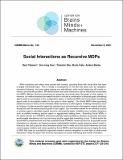Social Interactions as Recursive MDPs
Author(s)
Tejwani, Ravi; Kuo, Yen-Ling; Shu, Tianmin; Katz, Boris; Barbu, Andrei
DownloadCBMM-Memo-130.pdf (1.519Mb)
Metadata
Show full item recordAbstract
While machines and robots must interact with humans, providing them with social skills has been a largely overlooked topic. This is mostly a consequence of the fact that tasks such as navigation, command following, and even game playing are well-defined, while social reasoning still mostly re- mains a pre-theoretic problem. We demonstrate how social interactions can be effectively incorporated into MDPs (Markov decision processes) by reasoning recursively about the goals of other agents. In essence, our method extends the reward function to include a combination of physical goals (something agents want to accomplish in the configuration space, a traditional MDP) and social goals (something agents want to accomplish relative to the goals of other agents). Our Social MDPs allow specifying reward functions in terms of the estimated reward functions of other agents, modeling interactions such as helping or hindering another agent (by maximizing or minimizing the other agent’s reward) while bal- ancing this with the actual physical goals of each agent. Our formulation allows for an arbitrary function of another agent’s estimated reward structure and physical goals, enabling more complex behaviors such as politely hindering another agent or aggressively helping them. Extending Social MDPs in the same manner as I-POMDPs (Interactive-partially observed Markov decision processes) extension would enable interactions such as convincing another agent that something is true. To what extent the Social MDPs presented here and their potential Social POMDPs variant account for all possible social interactions is unknown, but having a precise mathematical model to guide questions about social in- teractions has both practical value (we demonstrate how to make zero-shot social inferences and one could imagine chatbots and robots guided by Social MDPs) and theoretical value by bringing the tools of MDP that have so successfully organized research around navigation to shed light on what social interactions really are given their extreme importance to human well-being and human civilization.
Date issued
2021-11-08Publisher
Center for Brains, Minds and Machines (CBMM), Conference on Robot Learning (CoRL)
Series/Report no.
CBMM Memo;130